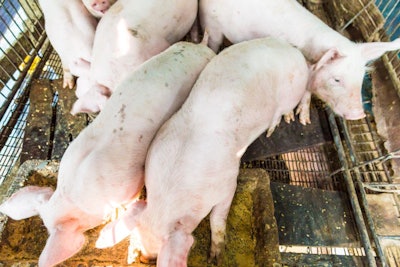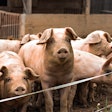
As Poland’s total outbreaks of African swine fever in domestic pigs reaches 90, more cases are confirmed in German wild boar.
Over the past two weeks, Poland’s chief veterinary office has confirmed a further seven outbreaks of African swine fever (ASF) among domestic pigs.
Included in the office reports in the period September 11-18 was one farm with more than 1,880 pigs. Other infected herds each had between 22 and 158 animals. A further 75 pigs have been culled in four herds that had recent contact with the affected farm.
Three of these latest outbreaks were in the province of Greater Poland (Wielkopolskie), two in Subcarpathia (Podkarpackie), and one in each of Lublin and Mazovia.
These recent cases bring Poland’s total since March to 90 outbreaks affecting almost 55,600 pigs. Fourteen of these outbreaks were among larger herds (of at least 300 animals).
Over the past two weeks, the country’s agriculture ministry has reported 40 ASF outbreaks in domestic pigs to the World Organisation for Animal Health (OIE). Starting in the period August 3-25, these outbreaks have already been covered by the veterinary office.
In the whole of 2019, 48 outbreaks of ASF were detected among Polish pigs.
Romania confirms 99 new ASF outbreaks in pigs
Over the past 10 days, the Romanian animal health agency has registered with the OIE a further 99 outbreaks of ASF among domestic pigs.
In total, 2,845 pigs were directly affected. Around 1,750 animals were involved in a single outbreak at a farm in the southeastern county of Buzau. All the other outbreaks involved backyard herds of no more than about 60 pigs.
More cases among Russian pigs
According to the latest reports to the OIE, ASF has been detected in 10 backyard pig herds in Russia’s western regions.
Between July 20 and September 10, ASF virus was identified among 10 small herds with a total of 273 pigs. The largest herd to be affected had 100 animals. Nine of the outbreaks were in Samara oblast (Volga federal district), while the other was in Kaluga oblast (Central federal district).
According to the latest reports to the OIE, ASF has been confirmed among a further 13 herds of domestic pigs in Russia’s Far Eastern federal district. Affecting a total of 362 pigs, 12 of the outbreaks were in small backyard herds, and one was on a farm with around 140 animals.
Starting between early August and mid-September, most of the affected premises were in Yevreyskaya (Jewish Autonomous Oblast), with others in Khabarovsk krai, and Primorsky krai.
2 Ukrainian regions declared free of ASF
The ASF situation in neighboring central-eastern oblasts Poltava and Dnipropetrovsk has been “resolved.”
In early August, the country’s veterinary authority reported to the OIE that a number of pigs carcasses found dumped near a Dnipropetrovsk village had tested positive for the ASF virus. Around the same time, the disease was identified in a Poltava backyard pig herd. No further cases have occurred in either oblast since that time.
6 European states report new cases of ASF in wild boar
At the start of September, Germany reported its first ever case of ASF in a wild boar carcass in the eastern state of Brandenburg. Although no cases have been detected in the nation’s domestic pigs, several countries have announced an immediate suspension of German pork imports.
Since the first confirmed cases on September 10, a further 12 cases have been confirmed to the OIE by the federal agriculture ministry. Cases continue to be confined to Brandenburg. Infected animals have been located in the neighboring municipalities of Neuzelle (Oder-Spree district), and Schenkendorben (Spree-Neisse district).
According to the country’s Friedrich-Loeffler Institute, one of the latest cases tested positive for the ASF virus after it had been shot. This suggests that the disease situation is ongoing, and that further cases can be expected as the autumn/fall hunting season continues.
In its two latest reports, Poland’s chief veterinary office has registered a further 77 cases of ASF in the country’s wild boar. Testing positive for the virus between August 18 and September 17, most the animals were found dead or shot in seven provinces. Previous cases had been recorded in each of these regions.
Over the past two weeks, other European countries reporting new cases of ASF among wild boar to the OIE were Romania (23 animals), Hungary (at least 10), Russia (9) and Latvia (7).
Veterinary authorities in Belgium and Moldova have confirmed to the OIE that there have been no recent cases among their respective wild boar populations.
Myanmar declares ASF ‘resolved’
This month, the livestock ministry reported to the OIE that the ASF has been “resolved.”
While there had been previous cases as recently as March, there was an isolated outbreak of the disease in a backyard herd in Shan state in April. No further cases have been detected in the state since that time.
Wild boar tests positive for ASF in Russia’s Far East
In addition to the new cases among domestic pigs in Russia’s Far Eastern district, one wild boar in Primorsky krai has also tested positive for the ASF virus.
View our continuing coverage of the global African swine fever situation.


















